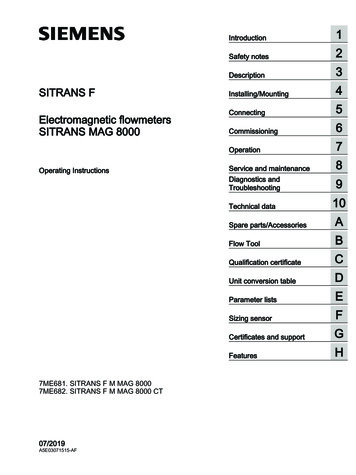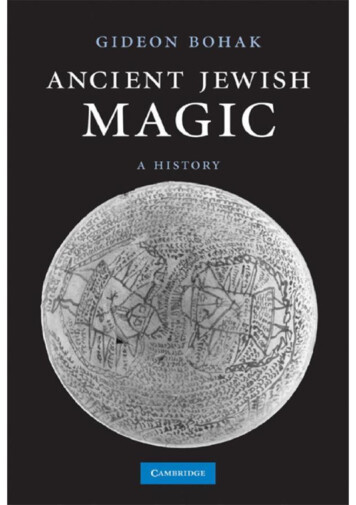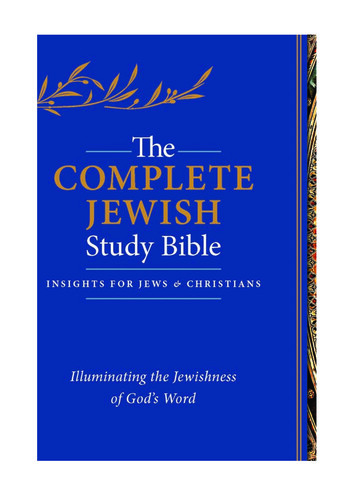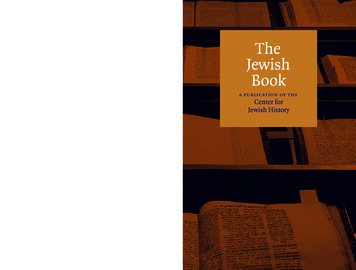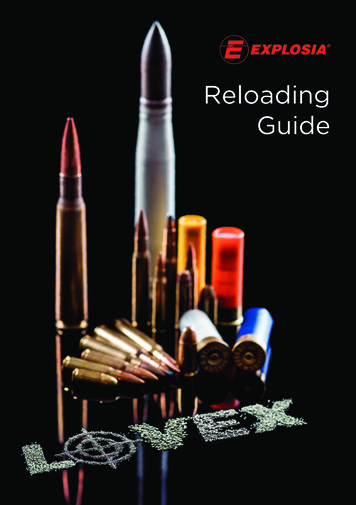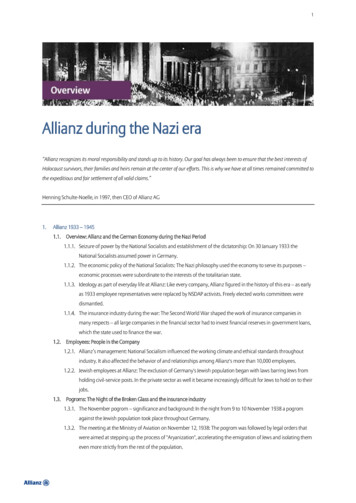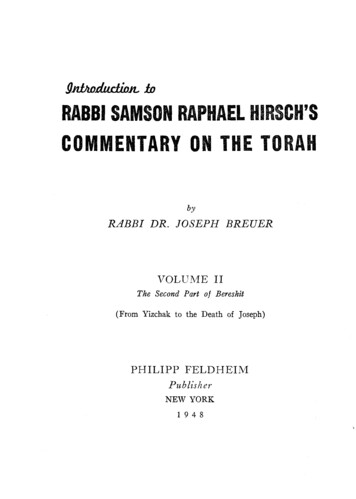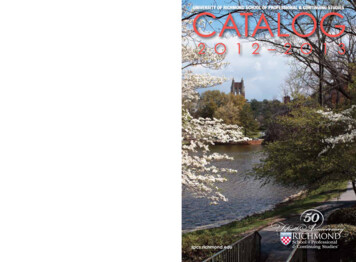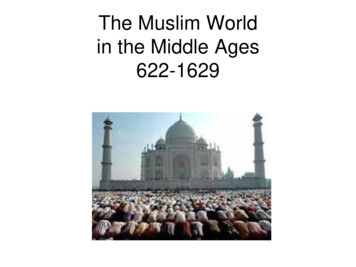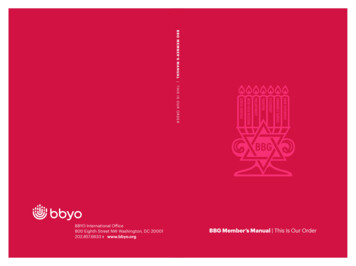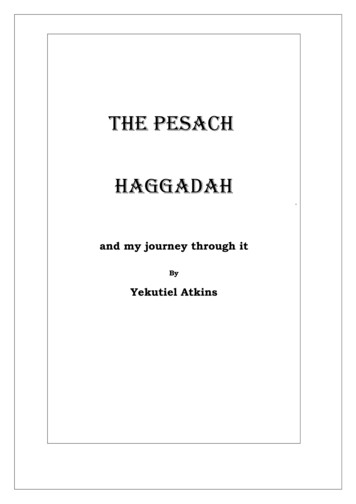
Transcription
THE PESACHHAGGADAHand my journey through itByYekutiel Atkins.
My Journey through the Haggadah by Yekutiel AtkinsMy Grateful thanks to the Holy One Blessed is He who has kept mealive unto this SeasonThe Guide to the Haggadah is dedicatedTo my wife Flora who has been an inspiration to me for all of ourmarried life and a true helpmeet and who has encouraged me in all that Ihave done.To my parents Harry and Rachel Atkins to my Zaida, Baruch Elya andBooba, Chai yenna who introduced me to life and to yiddishkeitTo my Parents in Law, Sam and Sara Marks from whom I learnt muchby their exampleTo my children and grandchildren from whom I learnt much moreTo my brothers and sisterTo my teachers and to all those from whom I learnt anythingTo the 120 generations of my ancestors from Abraham onwards to thepresent day who took seriously the command“and you shall teach it to your children”and to all those unnamed people who have had an influence upon meMy thanks also to my son Mordechai who researched the sources of thequotations and concepts3
My Journey through the Haggadah by Yekutiel AtkinsHow goodly are thy tents O JacobThy dwellings O Israel (Num Ch. 24 V.5)How shall I curse whom God hath not cursed,and how shall I execrate whom the Lord has not execratedFor from the tops of the rocks I see himAnd from the hill I behold himLo it is a people that shall dwell aloneAnd not be reckoned among the Nations. (Num. Ch. 23 V.8-9)From Balaam’s blessingof the Children of Israelagainst his willAnd you shall teach it diligently to your Children(Deut Ch.6 V.7)Moses received the Torah at SinaiAnd passed it to JoshuaWho passed it the elders who passed itTo the prophets, who passed itTo The men of the Great Assembly who passed itTo Simon the Just who passed itTo Antigonos of Socho who passed itTo Yose benYoezer and Yose benYochanon who passed itTo Joshua ben Perachya and Nittai the Arbelite who passed itTo Judah benTabbai and Simeon benShetach who passed itTo Shemayahu and Avtalion who passed itTo Hillel and Shamai (the Ethics of the Fathers Ch.1)Whopassed it on to their pupilswho passed it on to their pupilswho passed it on to their pupilswho passed it to our grandparentswho passed it on to our parentswho passed it on to usandWe must pass it on to our childrenWho must pass it to their children our grandchildrenWho must pass it on to their childrenuntil the end of days4
My Journey through the Haggadah by Yekutiel AtkinsGlossary of Sources researched by Mordechai ahJoshuaJoelLamentationsBook of otSotahTa’anithEthics of the Fathers (Pirke nidesNachmanidesRabbi Shlomo Itzchakion the TalmudBible:TalmudCommentariesCodes of LawHilch TshuvaMaimonides Laws of RepentanceShulchan Aruch Halacha derived from the Talmudcompiled by Joseph CaroOr ChOrach Chaim Section of the Shulchan Aruch,that deals with daily life, prayers, Shabbat,Festivals etc. also found inMish Ber.Mishna Berura commentary on the OrachChaim by the Hafetz Chaim, Rabbi Israel MeirHakohenMidrashMidrash Tanchuma5
My Journey through the Haggadah by Yekutiel AtkinsThe lay out of the HaggadahTranslations follow immediately after the Hebrew הא לחמא עניא “This is the poor bread”Instructions are written in Italics.Fill the first cup of wineMy commentary is separated from the text by a lineσ σ σ σ σ σ σ σ σ σ σ σ σ σ σ σ σ σ σ σ σ σ σ σ σ σ σ σ σ σ σ σ σ σ σ σ σ σ σ σ σ σ σ σ σ σ σ σ σσ σ σ σ σand writtenMaror is eaten to remind us of the bitter things that happened in EgyptQuotations are written. "Hear O Israel, the Lord is our God the Lord the One and Only(Based on the translation in “Art Scroll”)Sources such as Exodus Chapter 20 Verses 1-16(Ex. Ch. 20 V.1-16)10/1 HarosmarinJerusalemFax 02 676 5126Email catkins@netvision.net.il6
My Journey through the Haggadah by Yekutiel AtkinsAll rights reserved by the authorYekutiel AtkinsFrom whom permission must be obtained for any copying or photocopyingOr any other form of duplication10th Sivan 576415th May 2004Email catkins@netvision.net.il7
My Journey through the Haggadah by Yekutiel AtkinsFOREWORDSome 3000 years ago, an event occurred whose reverberations have continued to thepresent day. This event was the Exodus of the Jews from Egypt and their escape fromslavery. The slavery the Jews endured, and the subsequent Exodus, is indelibly etched intothe psyche of the Jewish people. It permeates the Torah, our liturgy, and not only the Festivalof Passover, which is the subject of this commentary, but the Shabbat and every Festival inthe Jewish calendar.It has a profound effect on our religion, on our relationship with our fellow Jews andour relationship with other peoples. It shaped our morality, our humanity, and the way wereact with and treat each other. It entered so deeply into the subconscious of the wholeJewish Nation, that much of our day to day activities are unknowingly and unthinkinglyshaped by it. It is no accident that Jews seem to be in the forefront of those seeking to betterthe lot of those less fortunate than themselves.However the Exodus and freedom from slavery was not a reason in itself. It was onlythe beginning of the story. What does it matter if a group of slaves escaped from theirmasters. Who cares if an insignificant tribe living in a tiny corner of the imposing andglorious Egyptian Empire 3000 years ago, slipped over the border into the desert.The Exodus was to lead exactly seven weeks later to the event that was a turningpoint in the direction that world civilization would take. The Exodus was the start of thefulfillment of the promise made to Abraham, Isaac, and Jacob the forefathers of the Jewishpeople, that their descendants would inherit the Land of Canaan. (Gen. Ch. 35 V. 12). But firstthey had to receive the rules that they were to live by and that event at Mt. Sinai seven weeksafter the escape was the event that changed the world forever.This event heralded a new era in man’s relationship to his fellow man. At first, it washardly noticed, but as time went on the Exodus of the Children of Israel from Egypt and thetwo Tablets of Stone they received some seven weeks after that dash for freedom, had anincreasing effect on the world. Today because of that event, the Jewish people for better orfor worse, are seldom out of the front pages of the world’s newspapers and the televisionscreens.If the Exodus had not happened, there would not be a Jewish people today, thereprobably would not be democracy in the world, there would certainly have been noChristianity or Islam. The way of thinking especially towards others would perhaps havebeen different, There probably would not have been the idea of Hillel's "Golden Rule' "Notto do to others what you would not have others do to you". In short the world would havebeen an entirely different place. It is true that there is still evil and evil people in the worldbut now because of what happened 3000 years ago we know that there is a morality and adecency towards which we must strive.That event, we celebrate during the Festival of Passover, more usually called by itsHebrew name ‘Pesach’. Probably no other home event has a more honoured and loved placein the Jewish Home than the Passover Seder which brings in the Festival and probably noother Jewish book has such an honoured and loved place in the Jewish home as the ‘PassoverHaggadah’.Together with Rosh Hashanah (the New Year) and Yom Kippur (The Day ofAtonement), Pesach is part of the glue that binds the Jewish people together no matter howtenuous is the individual's commitment to the tenets of Judaism.At the same time, to many people, the Passover Haggadah presents manydifficulties, particularly to those whose attitude to the Seder is more than that of a slap upmeal in the company of friends and relations. The Passover Haggadah has many facets; it is abook of history, study, prayers and hopes.8
My Journey through the Haggadah by Yekutiel AtkinsThe Commandment, ‘Mitzvah’ in Hebrew, to celebrate the Passover, is contained inExodus Ch.12 V.1-20. It is one of the three pilgrim festivals during which the Jewish peoplewere enjoined to travel to the Temple at Jerusalem for its celebration. The others are,Shavuoth, the Feast of Weeks, the festival celebrated seven weeks after Passover whichamong other events commemorates the giving of the Torah at Mt. Sinai and Succoth,Tabernacles, celebrated in the autumn after Rosh Hashanah and Yom Kippur.On Passover, in Temple times, the main event was the “Passover Offering”,consisting of a lamb or young goat, for each family which was slaughtered and eaten as partof the meal at the Seder. If the lamb or goat was more than enough for a family, severalfamilies, joined together to share in the meal. This could only take place within the city ofJerusalem, all the celebrants had to be in a state of ritual purity, and the males had to havebeen circumcised.The Torah tells us that Passover is to be celebrated throughout the generations in thespring. (Ex. Ch. 23 V. 15). We are commanded to tell our children what transpired in Egypt( Ex.Ch. 12. V. 26–27 et al) so long ago, to discuss and to instruct not only the children but also eachand every one of us, of the Exodus from Egypt, our escape from slavery and about themiracles and wonders that happened there. The Divine direction of those events, and thebeginnings, of the welding together of the Jewish people as a nation. The Haggadah says“Even if we are all wise, if we are all clever, if we are all old, and even if we are all learned in theTorah, it would still be our duty to tell the story of the going out of Egypt”.We are commanded "And you shall relate to your children on that day" (Ex Ch. 13 V 8),and that is precisely what we do on the Seder Night. As we recite the Haggadah during theSeder, we relate and recount to, and discuss with, the children and all those present, the storyof our deliverance on the anniversary of the day the Exodus from Egypt occurred.If we examine what we say, we will uncover and unfold the whole story and purposeof the Jewish people, to serve God and obey His commandments, and thus to be a “Kingdomof Priests and a Holy Nation” (Ex Ch. 19.V. 6). And so thereby impart to the nations of the worldthe knowledge and acknowledgement of the Almighty as Creator and Regulator of theUniverse and everything that is in it.However, the Commandment does not tell us what to say, or how to say it. To helpus, the Haggadah, was compiled by the Sages and Rabbis many years ago. It has beenhallowed by recitation throughout the ages and has been accepted by all traditions as themeans of "Telling The Story" which is indeed what the word Haggadah means. It containsmany allusions, quotes from the Bible and Talmud, quotes from sources which are todayunknown, prayers, blessings, instructions, children's songs and an altogether seeminghotchpotch through which we thread our way during the Seder.Each concept indeed in some cases just a word in the Haggadah triggers an aspect ofJewish practice and philosophy in much the same way that a student's notes will remind himof a whole lecture. This interpretation of the Haggadah, in all trepidation and humility willendeavour to explain some of those allusions and try and reveal some of the concepts behindthem. It does not pretend to be erudite but tries to explain in simple language my ownunderstanding during its recitation of our past our present and perhaps our future. This joinsthose countless editions of the Haggadah and commentaries published throughout thecenturies which help to enlighten us about our long history as a people and perhapsourselves.Hopefully this guide will strike a spark, take the reader further up the road of Jewishknowledge and study, and make Passover and the Seder even more meaningful.Just one more word, although I have taken great care, no Halachic, that is Jewishlaw, inferences should be drawn from it. Any Halachic questions should be addressed to acompetent Rabbinical authority.Y.A9
My Journey through the Haggadah by Yekutiel AtkinsINTRODUCTIONPesach or Passover has another name in the Torah, the Festival of Matzoth. It is alsocalled in the liturgy ‘The Season of Our Freedom’. It celebrates and marks the Jewishpeople's freedom from 210 years of slavery and domination in Egypt some 3,000 years ago.We will discuss more about “Freedom” later on in the comments on the Four Sons.The Torah, that is the Five Books of Moses, also known as The Pentateuch, is thestory of the Jewish People and the Commandments given to them, from their beginning withthe birth of Abraham until the eve of their entrance to the Land of Israel. Prior to this,however it opens with a brief account of the Creation of the Universe. This account is notmeant to be scientific treatise, as our Rabbis say, the Bible is written “in the language ofmen” *. There we learn from the story of Adam and Eve that we are all descended fromthose two first people, which makes all of mankind, related one to the otherWe are introduced to Abraham, (Gen Ch.11 V. 26) who, while not the first to come to anunderstanding of the One God, who is the 'Fount of All' and the 'Creator of the Universe', butwhose character and steadfastness makes him the one chosen by God. His descendants, theChildren of Israel, - the Jews, were to be the instrument by which the peoples of the worldwere to be introduced to the 'One God' and hopefully the understanding and final realizationof the brotherhood of manThe Bible tells us that Abraham was told by God to leave “Your land, your birthplaceand your father's house and to go to a place which I will show you”. (Gen. Ch. 12 V 1). He was alsotold that God would "Bless those who Blessed him" (Abraham). God also revealed toAbraham, in what is known as the “Brith bein Ha’betarim” – the “Covenant between thePieces", (Gen. Ch. 15. ), that his descendants were to spend 400 years in exile in a foreign land.The Rabbis calculated that this exile started with the birth of Abraham’s son Isaac so that theactual time spent in Egypt was only 210 years. The question arises why did Abraham’sdescendants have to spend any time in exile at all? After all the Land of Canaan waspromised to Abraham and his descendants (Gen. Ch.13 V. 14-17.) why not start there and then.The answer given by the Torah (Gen. Ch. V.15 v16) is simple. Abraham left Haran( Gen. Ch. 12. V. 5), the city in which his father had settled. ‘To go to the Land which I will showyou’, (Gen Ch. 12 V.1). Taking with him Sara, his wife, Lot his nephew and the people he hadmade, that is converted to the recognition of the Creator, the one and only God. When hewas gone, would their faith be strong enough to continue in his way? Abraham’s only son atthat time was Ishmael the son of Hagar his Egyptian concubine, who was not a member ofAbraham’s own tribe that had originated in Ur of the Chaldees.Much later Abraham was to send his servant Eliezer to Haran, where his immediatefamily still lived, to bring back for Isaac his son by his wife Sara, through whom the Jewishpeople are descended, a wife, Rebecca. (Gen. Ch. 24). Later still Jacob, Isaac’s son, also wentback to the family in Haran to find a wife from his ancestral family. (Gen. Ch. 28 V. 2.) Heeventually came back with four, (Gen. Ch. 29) Rachel Leah Bilha and Zilpah.Ishmael, Abraham’s other son by his concubine; Hagar married an Egyptian, as hismother was, (Gen. Ch. 21. V. 21). Of Isaac’s twin sons Esau and Jacob, Esau also married out ofthe tribe by marrying two local Hittite women, Judith and Basemath (Gen. Ch. 26. V. 34-35) muchto the great sorrow of his parents thus forfeiting the right of inheriting the mantle ofAbraham and of becoming one of the fathers of, and the ancestor of, the Children of Israel.Israel was the additional name given to Jacob by God, (Gen. Ch. 34 V. 10).By marrying into a people of idol worshippers there was a great danger of beinginfluenced by their wives and leaving the path chosen by Abraham. This showed thenecessity of Abraham’s descendants leaving Canaan and going into exile. By so doing andby being strangers in a strange land, they stuck together and married among themselves. In*see Appendix10
My Journey through the Haggadah by Yekutiel Atkinsthe end they became enslaved by the people among whom they lived which helped to keepthem together. Keeping their own laws and customs they were less influenced by the idolatryof the indigenous population.Had they stayed in Canaan the opposite might have taken place. Abraham and Isaacwere honoured by the people among whom they lived. However we see from the story ofDinah, (Gen. Ch. 34) how easy it is to be seduced by the pleasant but licentious and idolatrouslife of Canaan. It was essential therefore if God’s promise was to come to pass, that thedescendants of Abraham, Isaac and Jacob were to be a special people devoted to the one trueCreator of the Universe that the children of Israel had to be sent away, so that they wouldgrow into a cohesive people and not disappear by assimilation.Because of the famine in the land of Canaan, Jacob and his sons and their familieswent down to Egypt, (Gen. Ch. 46), where at first they were treated with honour for the sake ofJoseph, Jacob’s son who had become the viceroy and the most powerful man in Egypt afterPharaoh (Gen. Ch. 41 V 39-44). The account of Joseph being taken to Egypt, his trials andtribulations and his rise to power, the going down to Egypt by Jacob with his children, theenslavement of the Children of Israel, and the story of the Exodus, are told in the book ofGenesis from Chapter 37 to the end of the book, and in the first 17 chapters of the book ofExodus.The Exodus from Egypt, begins with the first commandment or “Mitzvah” to theJewish people as a people, and is the commandment to mark and celebrate the Rosh Chodesh(The New Month marked by the appearance of the New Moon) of the first month Nisan.( Ex. Ch. 12. V. 2). Nisan is the month in which the first Pesach and the Exodus occurred Thisfirst commandment addressed to the Children of Israel as a group, is the beginning of thehistory of the Jewish people as a people. Indeed in the special prayers recited duringPassover, Passover is called “the Season of our Freedom”.The Jewish people have been scattered far and wide, at first, after the destruction ofthe first Temple when we were exiled to Babylon for some 70 years until, under Ezra andNehemiah we were able to make Aliyah and return to the Promised Land. And then againwith the second Exile, after the rebellion against the Romans when the Temple andJerusalem were destroyed nearly 2000 years ago. During this long night of dispersion, we asa people experienced humiliation, pogroms, and persecution, forced conversion and thegreatest horror of all, the Holocaust. The remembrance of our Exodus from Egypt, thesubsequent gathering at the foot of Mount Sinai where we received the Torah (Ex Ch 20), thecelebration during the centuries of the Passover and the recitation of the Haggadah, kept ustogether as a Free (in our hearts) people, proud and subservient to no one, but the God ofIsrael.The commandment to celebrate the Passover Festival is given in Exodus Chap.12 V.1-20. These verses contain several commandments in connection with how the festivalshould be celebrated. Each family was to take a lamb or young goat for the PassoverOffering, which was to be the main part of the ceremonial meal. Before the lamb could beslaughtered, we were commanded to remove from our possession all Chametz (leaven) (Ex.Ch. 34 V. 25). If a lamb was too much for one family, two or more families should join together.It is to be celebrated from the evening of the 14th day of Nisan, which was to becalculated by the elders after deciding which day was the ‘New Moon’. They "should eat itwith Matzah and bitter herbs" (Num. Ch. 9 V. 11) .The Passover was to be kept "throughout thegenerations forever" (Ex. Ch. 12 V 14). For the seven days (eight outside Israel), no "chametz"was to be seen or found (in your possession) and certainly not eaten. (Ex. Ch. 12. V 19). In Ex.Ch. 12 V. 26-27 and in several other places the Jewish people are commanded to teach theirchildren throughout the generations the commandments and in particular those relating to theFestival of Passover.The Seder is the most outstanding ceremony of the Festival of Passover. The Sedermeaning "Order," of the recitation of the Haggadah and the festive meal takes place in our11
My Journey through the Haggadah by Yekutiel Atkinshomes on the first and (excepting in Israel) second night of the festival today as it has donefrom the time of Joshua's and the Children of Israel’s entry into the Land of Israel.(Josh. .Ch. 5 V. 10). Not in the same way however, as without the Temple we cannot offer thePassover Offering, which in Temple times was the central part of the Festival. The Seder isthe climax of the preparation for Passover, which has gone on from the end of the lastPassover a year ago, with the production of Matzoth and other specially prepared food stuffs.As mentioned above the Torah says that we are not to eat "Chametz" during theseven (eight days outside Israel) days of Passover, nor to have it in our possession or to ownit. (Ex Ch. 12 V. 15).We must now define what is Chametz. Chametz is the result of any of the fivespecies of grain, wheat, barley, spelt, oats and rye, ground or whole, being in contact withwater for more than 18 minutes without being baked in the oven. This of course includesdrinks that are made from grain such as whisky and beer and many others. Chametz is notthe process of fermentation in which case wine would not be permitted.Matzoth are made from dough made by mixing a special flour that prior to beingground has been specially watched and guarded so as not to come into contact with waterbefore being processed, with water and with no other additive, even salt. Special supervisionensures that the dough from which Matzoth is made is speedily processed so that no morethan 18 minutes elapses from when the dough is mixed and rolled out into matzoth until it isplaced in the oven. Ordinary flour that is bought in a store or supermarket is Chametz asbefore being ground, the wheat kernels are soaked in water for ease in milling.In modern times, we purchase many foods already processed and prepared. Evenwith reading the lists of ingredients on the label, how many of us know what is put in ourfood, which we buy so trustingly and eat. How many of us know what are the additives thecolours, taste enhancers, emulsifiers, anti-oxidants, hydrolyzed protein and other chemicalstoo numerous to mention many of which are made from chametz products that are put intomanufactured and processed food, let alone what is their origin.How much more so should we be sure, that all food and drink for Passover includingwine, spirits and liqueurs, even seemingly simple foods like sugar, tea, coffee, salt andspices, should not contain additives, which unknown to ourselves may be included, perhapsto stop them clogging or to enable them to “run” smoothly, that are ‘Chametz’. It is essentialtherefore that Matzoth and all processed food and drink that is bought to be consumed duringPassover are specially baked, cooked or otherwise prepared, under the supervision andendorsed as "Kosher for Passover" by a reliable Rabbinical authority, and carries theappropriate "Hechsher" (guarantee of fitness for use during Passover). This is so as to ensurethat no "Chametz" is included in the process or contents or additives of the product and isnecessitated by the strictness of the Mitzvah of, not eating, not owning, and not even seeingon our property the slightest vestige of "Chametz".To many people, these regulations may seem unnecessary hair splitting, but Jewishfood laws, kashrut and the observance of the Sabbath and the Festivals have been the bondsthat have kept the Jewish people together and helped us withstand the attacks both spiritualand physical that has been our lot throughout the ages.To make sure that no chametz is owned or seen or found during Passover theconscientious housewife begins her preparations immediately after Purim which takes placea month before the Passover. Gradually every room, every closet, every cupboard, everypocket is turned out and cleaned until on the night before the Seder the house is ready. Potsand pans, cutlery, china and glassware have all been replaced by utensils specially kept fromone year to the next, for the Passover. How to make sure that ovens, microwaves, gasburners and other kitchen equipment may be made fit for use over Passover, one must ask arecognized Rabbinical authorityThe Torah tells us that Passover must be celebrated in the spring. (Ex.Ch. 13 V. 4). TheJewish calendar is lunar, based on the cycle of the moon around the earth. The moon takes12
My Journey through the Haggadah by Yekutiel Atkinsabout 29 days and 12 hours to circle the earth. With a year of twelve months, the year istherefore about eleven days short of the solar year which is recorded by the secular calendar,and which is based on the earth circling the sun. To keep both periods synchronized so thatPassover always falls in the spring, 7 times during each period of 19 years an extra month isadded so that in every 19-year period, we have a 13-month year 7 times. This extra month isalways the month before Passover and is called the Second AdarThe Torah tells us that the Korban Pesach, the Passover Offering, is to be brought onthe 14th of Nisan in the afternoon, and that day strictly speaking, is the Festival of Passover.The Bible calls what we nowadays call Passover the “Festival of Matzoth”. The Festival ofMatzoth as mentioned above is celebrated on the 15th of the Hebrew month of Nisan,. As theJewish day begins at sunset, the Seder night is on the evening of the 14th of Nissan, which isthe beginning of the 15th of Nissan and is when, in Temple times the Passover Offering waseaten.There are therefore, two separate although joined festivals. One the Festival ofPassover that is the 14th of Nisan in which we are to bring the Passover Offering, whichtoday we cannot do since the destruction of the Temple in Jerusalem, some two thousandyears ago. And the Festival of Matzoth, which starts on the night of the 14th which is thebeginning of the 15th, the Seder night. The festival of Matzoth lasts seven days in Israel andeight days in the rest of the world. During this time we are not permitted as mentionedabove, to eat any food which contains chametz.The Torah tells us that the Passover Offering may not be brought with chametz inour possession. (Ex.Ch. 34.V. 25) so today, from the time that the Passover offering would havebeen brought in Temple times, we may not have chametz in our possession. This means thatwe have to remove all chametz from our houses by the ceremony of B’dikat Chametz. Thistakes place on the night of the 13th of Nissan that is the evening of the day before thePassover Offering would have been brought and the night before the Seder night. Anychametz found during the ceremony together with all other chametz in our possessionincluding that left over from breakfast, is burned the following morning.All these dates may sound complicated. To simplify matters if for example, the 15thof Nisan, Passover is a Tuesday, the Seder night; the beginning of the 15th of Nissan is onMonday night. B'dikat Chametz would take place on Sunday night and the chametz would beburned (Biur Chametz) on Monday morning at about 10.00 a.m. The actual time is usuallyannounced by the local religious authorities. About an hour before this, we must stop eatingchametz.The searching, “B'dika” is done as follows. After nightfall, one makes the appropriateblessing below, and with a lighted candle (some authorities permit using a flashlight) thehusband (or someone else) examines every nook and cranny in the house. With his wife andchildren in solemn procession, he gathers up any chametz that he finds. To make sure that hefinds some so that he does not make an unnecessary blessing, it is customary to place smallpieces of bread in various places so that he can find them. Many people use 10 pieces ofbread so that a known number can be collected and many wrap them in paper so that nocrumbs escape. If the Seder night is on Saturday night this is done on the previous Thursdaynight and the Chametz is burned on Friday morning.The following is the blessing made before the search "B'dikat Chametz" תו וְ ִצ ָנ ַעל ִ ע ר ָ ְב ִמ ְצ . ע ל ֲא ֶ ר ִק ְ ָ נ ָ ר ִא ָ יהוה ֱאל ֵֹ נ ֶמ ֶל ְ ָה ְ ָ" ָח ֵמ Blessed are You O Lord our God King of the Universe who has sanctified us by Hiscommandments and has commanded us to remove the chametz13
My Journey through the Haggadah by Yekutiel AtkinsAfter the search, whoever is making the search, makes this declaration. Although here it is inAramaic, the person conducting the search must understand the meaning of the words ָד ְענָא ַ ד ָלא י ְ ר ֵ ד ָלא ִ ַע ְ י ֵ ש תי ְד ָלא ַח ִמ ִ ירא וְ ֲח ִמ ָעא ְד ִא ָכא ִב ְר ָ ָ'ל ֲח ָמ . (ר ָעא ְ פקר ְ' ַע ְפ ָרה ְד ֵ ול ֱהוֵי ֶה ֶ ֵלי ִל ָ ֵטל The translation of the declaration.May all Chametz in my possession which I have neither seen or removed be annulledand considered as the dust of the earthThis declaration is made in Aramaic the language of the Jews in Eretz Yisrael whenthe Haggadah was first compiled. However, as with most prayers or declarations this may beand even should be made in a language that one understands. The chametz that he hascollected together with all chametz that still remains in the house is burned the followingmorning. To make
Bible: Chron Chronicles Ezek. Ezekiel Isa Isaiah Jer. Jeremiah Josh Joshua Joel Joel Lam Lamentations Meg.Esth Book of Esther Mic Micah Ps. Psalms Sam. Samuel . The Commandment, 'Mitzvah' in Hebrew, to celebrate the Passover, is contained in Exodus Ch.12 V.1-20. It is one of the three pilgrim festivals during which the Jewish people
